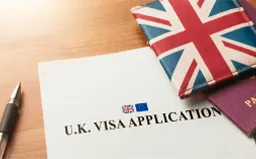
Oxford Brookes University at SI-UK London
Monday, 24 September 201811:00 AM - 11:30 AM
Location SI-UK London Office

Set in a historic student city, Oxford Brookes is one of the UK’s leading modern universities and enjoys an international reputation for teaching excellence and innovation as well as strong links with business and industry.
Oxford Brookes is ranked in the top twenty in seven subjects in the Times and Sunday Times University Guide, including:
- Physiotherapy (5th)
- East and South Asian Studies (10th)
- Town and Country Planning & Landscape (13th)
- Subjects Allied to Medicine (14th)
- Hospitality, Leisure, Recreation & Tourism (14th)
- Art and Design (18th)
- Anthropology (20th)
Event location
Why attend an SI-UK Event?

Meet Official Representatives of UK Universities

Ask The Important Questions

All Events Are Free

Free UK University Application Service
By attending an SI-UK event, you will have the opportunity to meet representatives from various UK universities in one location, ask questions directly to university representatives, network with other students, and take part in seminars and workshops hosted by university lecturers.
- Before attending the event, research the universities you're interested in.
- Bring copies of your academic transcripts, test scores (if applicable), and any other relevant documents.
- Inquire about specific courses, entry requirements, scholarship opportunities, accommodation options, and support services for international students.
- Jot down important information during your conversations with university representatives.
- Collect contact information from the representatives you meet and follow up with any additional questions or inquiries you may have after the event./li>
- What are the entry requirements for the course(s) I'm interested in?
- Are there any scholarships or financial aid options available for international students?
- What support services are available for international students, such as accommodation assistance, academic advising, and counseling?
- Can you provide information about the campus facilities, including libraries, laboratories, sports amenities, and student clubs?
- What is the teaching style like, and how much emphasis is placed on practical experience or research opportunities?
Attendance at SI-UK events is free for prospective students.
Preparing for a university visit is essential to make the most of your time there. Some things you should do include:
- Research the university and your favorite courses in advance.
- Prepare a list of questions to ask
- Bring copies of your academic documents and any other relevant materials.
- Dress appropriately and professionally.
- Take notes during your visit to remember important details later.
Scholarships for Indian Students
UK University Fair India scholarship advice
SI-UK can help Indian students interested in studying in the UK secure scholarships, grants and bursaries. Our close relationship with UK universities, combined with our online resources, means all deserving applicants can find the right scholarship to benefit their future.
What type of funding is available in the UK?
There are many different types of scholarships that Indian students can apply for in the UK, including:
- Full scholarships that cover tuition fees and living costs
- Part scholarships that cover a variety or a small section of expenses, such as living costs or whole or part of your tuition fees
- Country-based scholarships which are only open to students of a particular region or country
- Course scholarships that are only open to students on a particular course
- Government scholarships that are funded by the Government and run through companies such as Chevening or the Commonwealth Scholarships for Developing Commonwealth Countries
What is the difference between a scholarship, grant and bursary?
- Scholarship: A payment made to support a student's education, awarded on the basis of academic ability
- Grant: A payment made to support a student's education, awarded on the basis of ability, circumstance or financial need
- Bursary: A payment made to support a student's education, awarded on the basis of financial need
UK University Fair India Registration
Universities at the University Fair India want you to study in the UK, and many will do whatever they can to help you achieve that, including making you aware of the different types of financial aid which are available to apply for.
Register today for free entry to meet UK universities and speak to our international application experts about scholarships and funding in the UK.
Supporting Documents
When attending a UK university open day as an international student, you must bring along several supporting documents to ensure you have all the necessary information and materials. We recommend that you bring:
- Academic Transcripts: Please provide copies of your high school transcripts and any previous academic qualifications, such as diplomas or certificates.
- English Language Proficiency Certificate: If English is not your first language and you've taken an English proficiency test (such as IELTS or TOEFL), bring a copy of your test results.
- Passport: Your valid passport or any other form of identification.
- Visa Documents: If you already have a student visa or have applied for one, bring copies of relevant visa documents or confirmation of visa application.
- Resume/CV: Please include a copy of your resume or curriculum vitae (CV) detailing your educational background, work experience, extracurricular activities, and any other relevant achievements.
- Portfolio (if applicable): If you're applying for a creative or practical course that requires a portfolio (e.g., art, design, architecture), bring samples of your work or a portfolio showcasing your skills and creativity.
- Reference Letters: Copies of reference letters from teachers, professors, or employers that support your application.
By bringing these documents, you'll be well-prepared to engage with university staff, gather relevant information, and make the most of your UK university open day experience as an international student.
Student Visa Procedures
If you wish to study at a UK university, college and language school then you will need to apply for a visa. Applying for a visa is normally the last hurdle in the admissions process; however it is essential that students start preparing for it immediately, saving stress later in time.
What do I need for my visa application?
Before preparing your application, you will need a number of different documents (all original copies) to prove who you say you are. These include:
- Your current passport and any previous passports that you have, that contain a UK visa
- Two passport photos which meet the requirements of the Home Office
- Financial documents which prove you have the required funds available to you
- If you are being officially financially sponsored you will need a letter from your sponsor confirming the sponsorship arrangements
- Evidence of previous qualifications
If you are deemed to be in a low-risk country by the Home Office, you might not even need to send in all of the above to obtain your visa. Be sure to have them ready though, just in case. All visa application forms are now available on the Home Office online portal.
Two-year post-study work visa
The two-year post-study work visa allows Indian students who successfully complete an undergraduate degree in the UK to stay in the country for a further two years after graduation.
The scheme aims to provide greater opportunities to international students who wish to remain in the UK after the successful completion of their degree and, after issuing over 250,000 study visas to international students wishing to study in the UK last year - 13% higher than the preceding 12 months - the UK remains a premier global study destination.
Attend the UK University Fair India
Learn more about all aspects of studying in the UK by meeting UK universities at an upcoming UK University Fair in India.
Types of Student Visa
| Types of student visa | Who can apply? |
|---|---|
|
Student visa |
You can apply for a Student visa to study in the UK if you’re 16 or over and you:
|
| Student visa (family members) |
Your partner and children (‘dependants’) may be able to apply to come to the UK or stay longer in the UK. You must be one of the following:
|
| Child Student visa |
You can apply for a Child Student visa if you’re between 4 and 17 years old and you want to study at an independent school in the UK. You must:
|
|
Standard Visitor |
You can visit the UK as a Standard Visitor for tourism, business, study (courses up to 6 months) and other permitted activities. |
| Short Term Study |
You can apply for a Short-term study visa to study English language in the UK on courses lasting between 6-11 months. |
My consultant was very helpful and motivating. She helped me every step of the way, even when the deadline was so close. I feel I could not have done it without her. I'd highly recommend this service to any and all of my many friends interested.
Brishti Basu Biosciences at Coventry University









.jpg)
